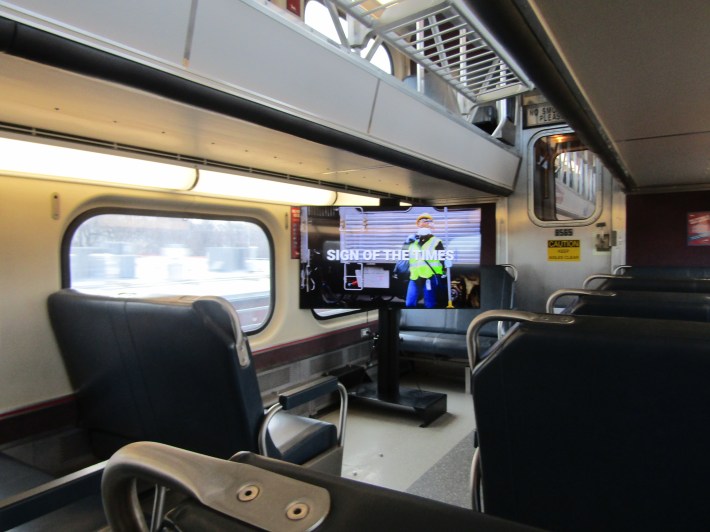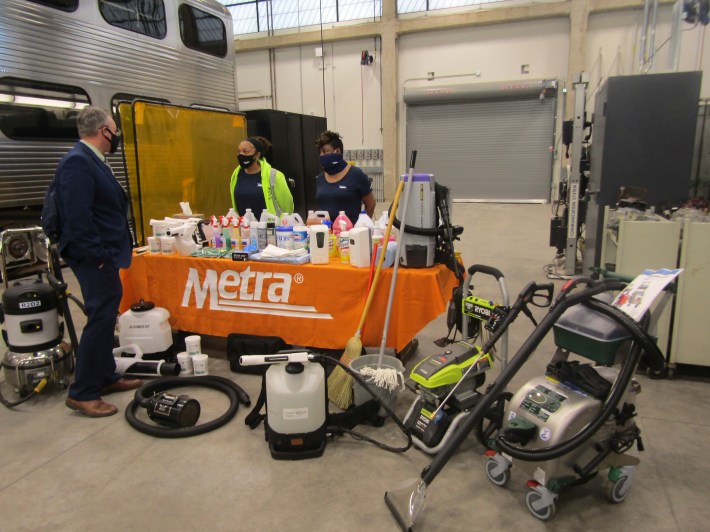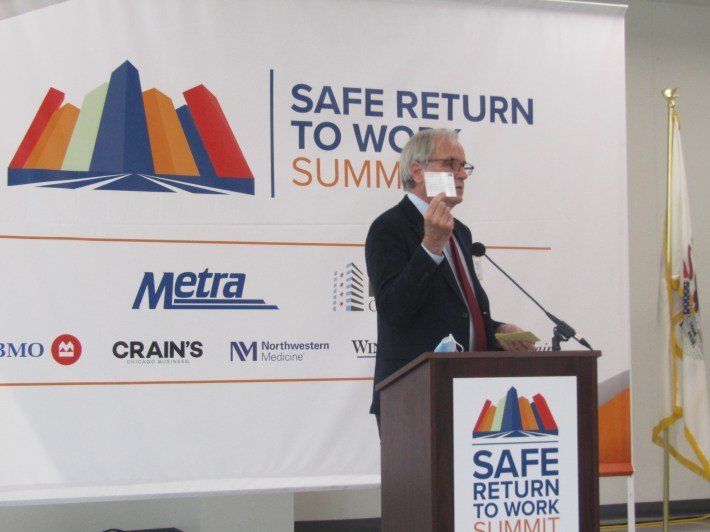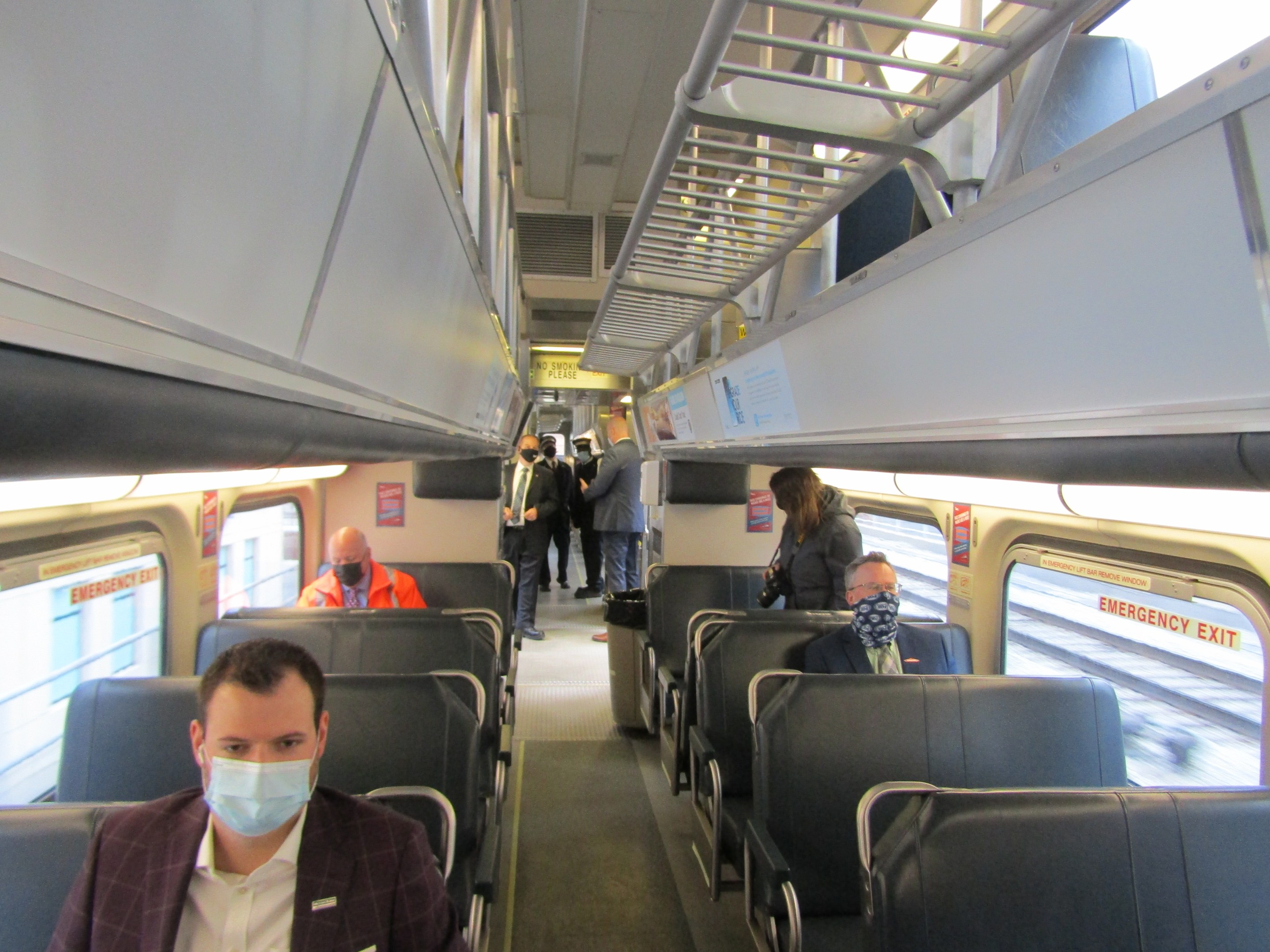When Dave Casper, CEO of BMO Financial Group’s U.S. operations, said that the current, mostly online state of office work was “not the new normal” but “abnormal,” and that “We’re getting back to normal, and normal is getting back to the office,” the conference room at Metra’s 49th Street Training Center, located just east of the Dan Ryan, erupted in applause.
“Trust me, not everybody is as enthusiastic,” he responded.
But if there was one common theme at the March 11 Safe Return to Work Summit, it was that online meetings couldn’t replace in-person interactions, and that companies should try to reinstate some form of in-person work as soon as it’s safe to do so. The event was organized by the Metra and the Building Owners and Managers Association of Chicago to discuss what the commuter railroad and office building landlords are doing to make it safer for companies to bring their employees back to their offices. They argued that cleaning procedures, better air filters, changes in layout and universal mask-wearing would reduce the risk of viral spread – even while acknowledging that some risk will remain until the majority of the population is vaccinated.
Downtown office commuters have traditionally been a major part of Metra ridership, and the transit agency never shied away from acknowledging the reality that its financial future hinges on those commuters taking trains to work again. Metra has been in constant communication with major companies in Chicago and major suburban reverse-commuting destinations such as Northbrook’s Lake Cook corridor to try to stay on top of major changes.
While most attendees watched the summit online (view it here), Metra allowed up to 50 people to attend in person. It even ran a special free express train to the rail yard where the training center is located, though only five attendees (including yours truly) took advantage of that. Those who did attend in person were invited to walk through a freshly cleaned train car, see what kind of cleaning products Metra is using, and talk to the staff.

Metra Executive Director Jim Derwinski said that, sooner or later, demand for commuter service will start returning to normal. “It’s time to get Chicago moving again by bringing employees back together, back to the workplace. There’s no collaborative tool that can replace in-person networking. You can’t build a company culture on a video call.”
Casper noted that many of BMO Harris Bank employees, such as bank tellers, never had an option of working remotely. The bank added plexiglass at the teller stations and other audience-facing work areas, and installed hand sanitizers for customer and employee use. “They set an example [of] how you can do it safety."
But even the employees who can work remotely face obstacles, such as distractions and connectivity issues. And Casper argued that the new hires lose out on mentoring experiences they would get from in-person interactions, which online mentoring can’t quite substitute for.
Casper also noted that his bank has processed a number of Paycheck Protection Program loans, and commuters coming into Chicago would benefit the kind of businesses those loans were meant for. “When you get off the Metra train and you walk to the office, take a look around at all the restaurants, ant all businesses that rely on people to show up for work – that needs to come back. Commerce is not being able to say, 'We can work from home.' Commerce is supporting business around it.” While Casper didn’t mention when BMO Harris might brings the rest of its employees back to in-person work, he encouraged businesses to do so once they know they can be done safely.
Janice Thomas, Metra’s chief of staff, discussed COVID-19 safety on board Metra. She said that, to date, no COVID-19 infection among passengers has been traced back to the trains. However, as I reported earlier this month, as of February 16 at least 313 Metra employees had tested positive, and four people who had been working the Metra system had died from the coronavirus.
Thomas said that requiring face coverings and installing hand sanitizer dispensers early on, as well as encouraging riders to use the Ventra app in lieu of cash, helped reduce the risk of transmission, as did the regular cleanings of the system. In the wake of the Biden administration's federal mask mandate, Metra no longer sells tickets to people not wearing masks, but conductors are instructed to not confront violators on the trains.

The train cars use hospital-grade NERV-13 air filters, and fresh air is circulated every time the train cars open doors. “We’ve thwarted the virus in every possible way we can conceive, but we will continue to tell our story to build confidence in riders as they return to the workplace."
Tony Scacco, chief operating officer of Riverside Investment and Development, a major Loop office building landlord, said that strategies similar to Metra’s are key for making offices safer: regular cleanings and investing in NERV-13 air filters, or better yet, NERV-15 filters. “The minor cost is the increase in energy consumption, which I think everybody agrees is a worthwhile trade."
Scacco said given that an average elevator ride is under two minutes and elevators are ventilated, the risk of transmission while riding one is low. The issue of high-touch surfaces could be addressed with regular sanitation and use of “antimicrobial coatings and alloys, and the deployment of touchless fixtures.”
Heather Spearman, regional operations manager at Jones Lang LaSalle, another major office property company, noted that even before the pandemic, many buildings had switched to touchless entry using cards or key fobs. She said it's important to make sure hand sanitizers, gloves and other Personal Protective Equipment is available to building cleaning and security staff, and focus the cleaning on common areas, such as conference rooms and fitness centers. Spearman emphasized that returning probably wouldn’t mean regular office hours, at least not right away, suggesting having different employees come in shifts as a possible alternative to avoid crowding.
Metra's Derwinski said that, if many companies decide to go that route, the railroad will adjust the schedules accordingly.
Both Scacco and Spearman said tenants and landlords should communicate with each other to figure out the best way to bring employees back and what kind of adjustments are needed. When asked if open floor plans would “go away,” Scacco said that he didn’t feel comfortable predicting longterm trends, but added that the advantage of such plans is that they can be reconfigured for social distancing.

Dr. Robert Murphy, executive director of Northwestern University Feinberg School of Medicine’s Institute for Global Health, said that, while vaccinations will allow for a return to relative normalcy, the vaccination drive is racing against the clock, “like two trains going in parallel tracks,” against the SARS-CoV-2 virus variants. While, so far, the vaccine has worked against all variants, they are more infectious. If the vaccination drive isn’t fast enough, the cases would increase again, setting back any return to in-person work.
Nonetheless, Murphy said he was optimistic that outracing the variants would be feasible once the vaccine production scales up. “This situation with the vaccine shortage will end very soon, [within] two months. I think we can beat the variants, because of that increase in vaccine supply.”
And Murphy added that, while he was originally skeptical of Metra’s response, the railroad has since won his confidence. “They’ve done a wonderful job cleaning up the train system and making travel safe. And the numbers tell the story – there’s no [passenger] who has contracted the virus from the trains.”




